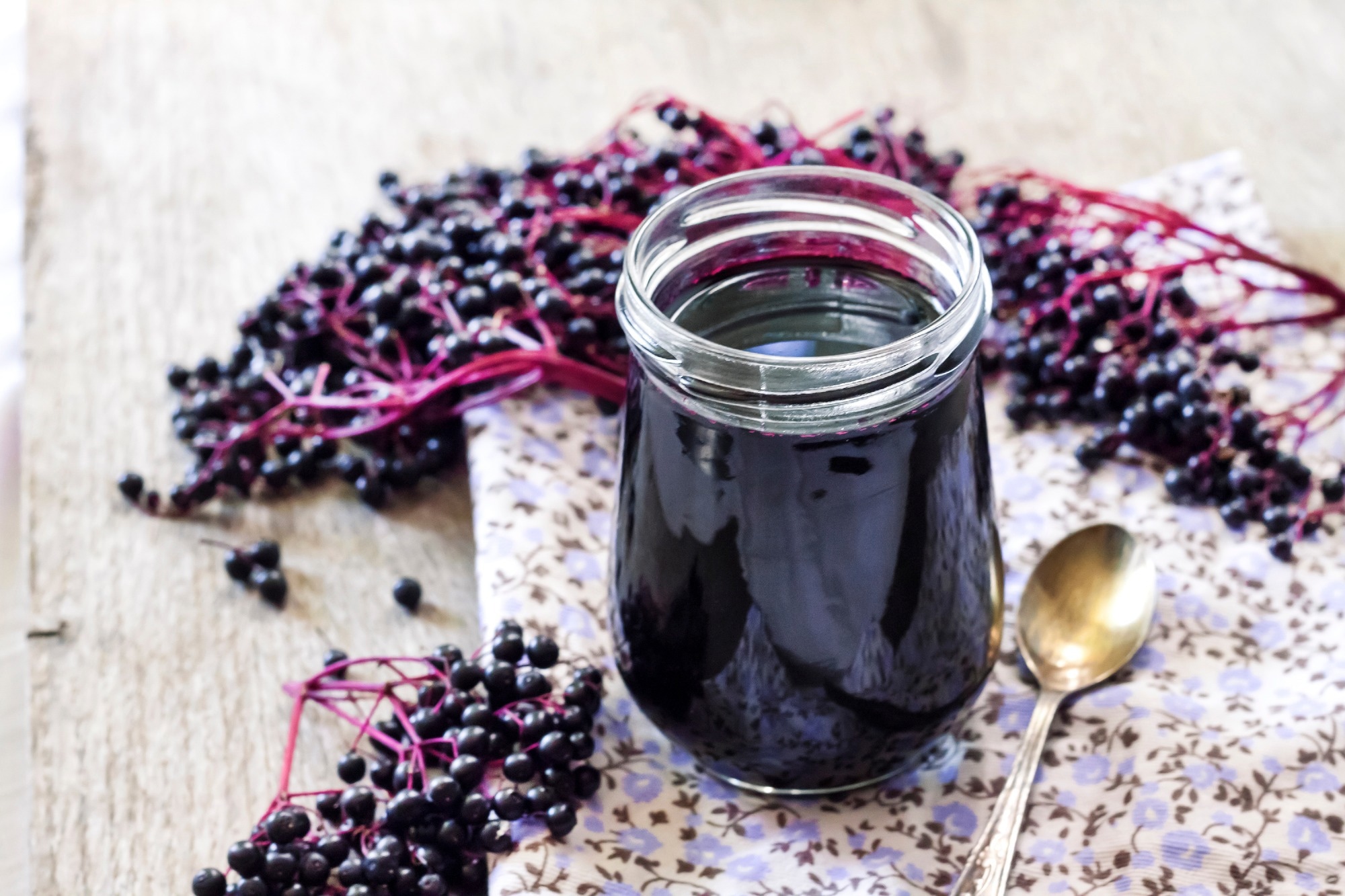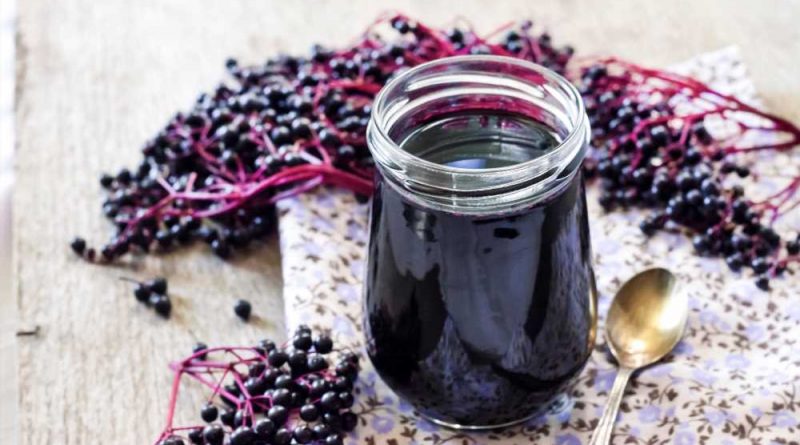Study indicates that elderberry juice consumption increases carbohydrate oxidation in obese adults
A recent study published in the Nutrients Journal evaluated the effects of elderberry juice (EBJ) consumption on indirect calorimetry (IC) and insulin sensitivity/ glucose tolerance measures in a placebo-controlled, randomized, crossover pilot study.
 Study: One-Week Elderberry Juice Treatment Increases Carbohydrate Oxidation after a Meal Tolerance Test and Is Well Tolerated in Adults: A Randomized Controlled Pilot Study. Image Credit: TYNZA/Shutterstock.com
Study: One-Week Elderberry Juice Treatment Increases Carbohydrate Oxidation after a Meal Tolerance Test and Is Well Tolerated in Adults: A Randomized Controlled Pilot Study. Image Credit: TYNZA/Shutterstock.com
Background
Estimates from the United States (US) Centers for Disease Control and Prevention (CDC) indicate that there are twice more states with adult obesity rates of 35% or higher in 2022 than in 2018.
The associated medical authorities call for higher access to healthcare, physical activity, and healthy foods to slow/reverse the obesity epidemic.
Berries fall under healthy foods and are rich in polyphenols, especially anthocyanins, and flavonoids. Prospective cohort studies show an association of anthocyanin consumption with reduced risk of type 2 diabetes, cardiovascular disease, and mortality. Further, short-term clinical studies report glucose tolerance improvements with berry interventions.
About the study
In the present study, researchers evaluated the effects of consuming EBJ on insulin sensitivity and oxidation in obese or overweight adults. Adults aged 22-75 with a body mass index (BMI) of 25 kg/m2 or higher were recruited between July 2021 and August 2022. Subjects were screened for eligibility using health history questionnaires.
Individuals were excluded if they were pregnant, lactating, or had delivered in the past year. Eligible subjects were screened using an automated self-administered 24-hour (ASA24) dietary assessment tool for unusual diet patterns. Participants continued their habitual diet and refrained from taking dietary supplements throughout the five-week study period.
Participants were given a list of high-polyphenol foods and asked to avoid eating listed items. The team implemented a randomized placebo-controlled crossover study design with two treatments. Each one-week intervention period was separated by a three-week washout period.
Participants consumed 100% EBJ or a sugar/flavor-matched placebo beverage for one week. Subjects were randomized to sequence one (EBJ then placebo) or two (placebo then EBJ).
Participants reported to the clinical laboratory on the eighth day of treatment for indirect calorimetry (IC) and meal tolerance test (MTT) examination. Two baseline samples were obtained 10 minutes apart, followed by a test meal and the (treatment) beverage. Blood samples were collected every 30 minutes after the meal for three hours, concurrent with IC testing.
Participants also performed a low-intensity exercise (treadmill walk) for 30 minutes after the last blood sampling. Serum glucose and insulin response curves were plotted from the MTT. The incremental area under the curve (iAUC) was computed. Linear mixed models tested differences between treatments.
Findings
Overall, 10 subjects were randomized to the protocol. One was excluded due to uncontrolled diabetes indicated by fasting glucose levels. Both treatments were well tolerated, without reports of gastrointestinal distress. Seven participants were females, and two were males. On average, participants were aged 55.3 and had a BMI of 29.8 kg/m2.
Several technical failures during MTT led to an unbalanced dataset. Nonetheless, statistical analyses included all (partial) datasets. The team observed significant differences between treatments for mean respiratory quotient (RQ) and the corresponding carbohydrate and fat oxidation across IC intervals.
EBJ treatment significantly increased the average interval RQ, corresponding to an increase in carbohydrate oxidation and a decrease in fat oxidation. There were no treatment effects on the average energy expenditure (EE).
IC measures were similar during the treadmill walk, albeit statistically insignificant. No significant differences between treatments were observed in iAUC for serum glucose and insulin.
Conclusions
EBJ treatment did not affect serum glucose/insulin after taking the test meal. However, it significantly increased the mean carbohydrate oxidation, with a concomitant decrease in fat oxidation. There were no treatment differences in EE.
Taken together, seven-day consumption of EBJ caused an increase in postprandial carbohydrate oxidation, following a high-sugar MTT, without affecting serum glucose/insulin levels. Moving forward, further studies are necessary with an increased sample size to determine the utility of EBJ on these outcomes.
-
Rust, B. et al. (2023) "One-Week Elderberry Juice Treatment Increases Carbohydrate Oxidation after a Meal Tolerance Test and Is Well Tolerated in Adults: A Randomized Controlled Pilot Study", Nutrients, 15(9), p. 2072. doi: 10.3390/nu15092072.https://www.mdpi.com/2072-6643/15/9/2072
Posted in: Medical Science News | Medical Research News | Medical Condition News | Healthcare News
Tags: Anthocyanin, Blood, Body Mass Index, Carbohydrate, Cardiovascular Disease, Diabetes, Diet, Elderberry, Exercise, Fasting, Glucose, Healthcare, Insulin, Laboratory, Mortality, Nutrients, Obesity, Physical Activity, Placebo, Polyphenol, Respiratory, Supplements, Type 2 Diabetes

Written by
Tarun Sai Lomte
Tarun is a writer based in Hyderabad, India. He has a Master’s degree in Biotechnology from the University of Hyderabad and is enthusiastic about scientific research. He enjoys reading research papers and literature reviews and is passionate about writing.
Source: Read Full Article
